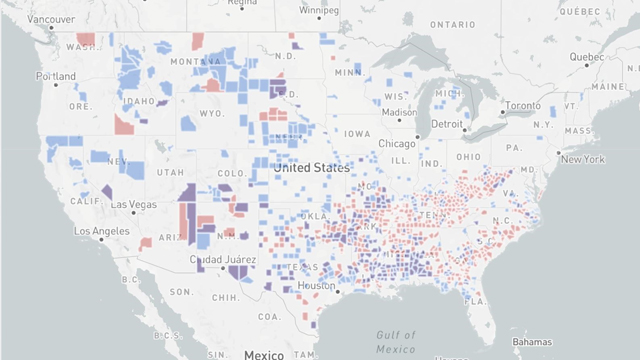by Jennifer Spiegel for New Jersey Policy Lab
The COVID-19 pandemic has emphasized the importance of online connectivity in society today. Yet there is still a digital divide as inequitable access to broadband services prevents underserved communities from benefiting from vital programs. Research shows that there are significant associations between lack of access to broadband services and access to healthcare, and many of these gaps occur in rural communities – especially in Native American tribal lands.
The Federal Communication Commission’s Mapping Broadband Health in America platform[1] supports these findings. By overlaying rurality with broadband and public health access levels, the map below displays that many of these gaps occur in the same counties. This map displays rural counties[2] that are lacking in broadband access[3] and where 20–52% of the population report poor or fair health. The counties lacking broadband access appear in blue. The counties with higher levels of poor or fair health appear in red. Counties that overlap appear in purple.
FCC Map of Gaps in Broadband Access & Public Health in Rural Counties

This map displays a pattern throughout the rural South and mountainous West of the United States. Areas lacking broadband access also have areas of poor health nearby. Some of the largest “purple” counties — Apache County, AZ, San Juan County, UT, and counties in North and South Dakota — are home to many Native American reservations. According to an American Indian Policy Institute analysis of FCC data, “just 67% of tribal lands in the continental U.S. have access to broadband internet, with the majority only having access to broadband speeds considered by the FCC to be less than ‘minimally acceptable.’”[4] This deficit emphasizes the importance of bridging the digital divide amongst Native American populations by investing in broadband infrastructure and public health services in these communities.
The federal government is attempting to tackle this problem. The recently-passed Infrastructure Investment & Jobs Act[5] contains “Tribal Connectivity Technical Amendments” that award $2 billion to the Tribal Broadband Connectivity Program, which provides grants for broadband deployment on tribal lands, as well as for telehealth, distance learning, broadband affordability, and digital inclusion.[6] The amendments expand the time limit for grantees to use the funds and allow a slightly larger percentage of grant money to be used for administrative and planning purposes. The goal is for more extensive and more difficult broadband infrastructure projects, previously deemed infeasible, to be able to break ground on tribal lands.
The Infrastructure Act builds upon the $31 billion allocated to tribal communities by the American Rescue Plan to combat COVID-19. These programs recognize the digital equity issues in Native American communities and promotes policy solutions to bridge the digital divide displayed by the FCC map. The recent passage of these bills provides policy solutions that are pivotal to narrowing the disparities in broadband access between rural and urban areas and connecting the most vulnerable citizens to vital governmental, non-profit, and health services.
